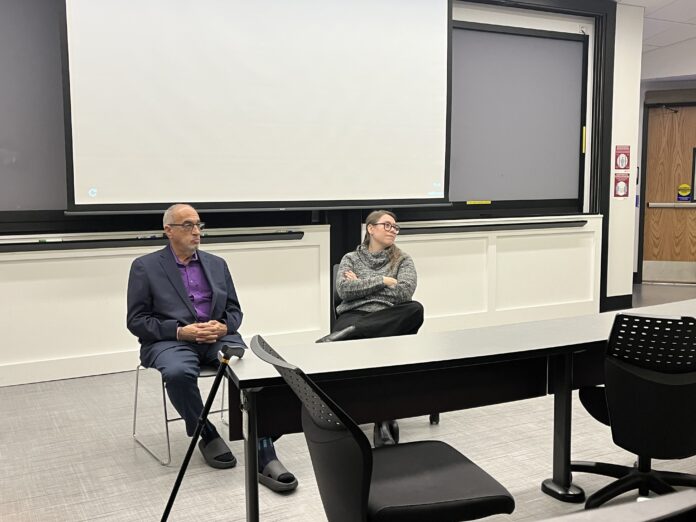
On Oct. 18, a film screening of the documentary “Takeover” and discussion with Director Emma Francis-Snyder and Producer Miguel “Mickey” Melendez occurred. Director of Film Studies and Professor of Media & Communication Amy Corbin, Ph.D., stated that this is a “true example of a multidisciplinary event.”
“Takeover” is an Emmy nominated and Oscar shortlisted 38-minute documentary that explores the 12 historic hours on Jul. 14, 1970 where 50 members of the Young Lords Party (Puerto Rican activist group) stormed into the rundown Lincoln Hospital in the South Bronx, drove out their administrative staff, barricaded entrances and windows and made their cries for decent healthcare known to the world. This documentary highlights actions that ordinary citizens can take to change the conversation– and the country.
Francis-Snyder is a New-York based activist and filmmaker. She is a winner of the 2017 Brooklyn Film Festival Exchange pitch, invited to the 2020 Big Sky Documentary Film festival and awarded a grant from the Ford Foundation. Francis-Snyder’s film “Takeover” had its world premiere at the Tribeca Film Festival and is now available to stream through The New York Times Op-Docs (short opinion documentaries).
Melendez is a first generation “Cuban-rican,” who helped create the national Patient Bill of Rights and is the co-founder of the Young Lords Party in New York. The Young Lords Party’s objective is to confront the root causes of inequality and discrimination within the Bronx. The hospital takeover wasn’t the first time they assumed control of a substance. In fact, there were many staged occupations and takeovers led by the Young Lords that presented social injustices through savvy media coverage and other means.
An example of another important takeover was seizing an X-ray unit for Tuberculosis (TB) testing. The X-ray kept going to other boroughs of New York City, mostly in neighborhoods that were white, industrialized, educated and rich. There was a tuberculosis endemic going on in the Southern Bronx, but testing for tuberculosis was scarce to none. The Young Lords decided to seize an X-ray truck when it was in Brooklyn and sent it over to the Southern Bronx so people in their neighborhood could be tested. The two technicians did not complain as there were never many people in line waiting for TB testing before. The positive media coverage was key in making sure that nobody would get into trouble for taking ahold of the truck.
After the takeover of the hospital, it took seven years for the city to rebuild Lincoln Hospital in the South Bronx. The aftermath of the takeover also included the drafting of the Patient Bill of Rights and Responsibilities, which allows for people to be treated with dignity and respect while being a patient at the hospital. Before the drafting of the bill, the Young Lords felt as if their voices and concerns regarding their healthcare were not addressed. The Patient Bill of Rights and Responsibilities is now crucial in healthcare and health insurance settings. As Young Lords member Felipe Luciano said in the documentary, “A revolutionary act cannot be erased.”
Francis-Snyder was inspired to create this film as she tried to protest at her school but failed to successfully accomplish this. This was because “we told the administrators that we were going to protest, so the administrators shut it down immediately.” This caused Francis-Snyder to look into the civil rights movements along with Black and Latine movements. Through her findings she was able to delve into research regarding the Young Lords.
Corbin stated that she “teaches fiction films. While I was on sabbatical last spring it was my goal to watch more films. I was in the Op-Docs section of The New York Times and I stumbled upon this film. I wanted other disciplines at Muhlenberg to watch the film and see if it was relevant to their respective departments,” so I contacted director of Latin and American Caribbean studies Elaina Fitzpatrick-Sifford, Ph.D., Public Health Professors Chrysan Cronin, Ph.D., Kathleen Bachynski, Ph.D., and Jacqueline Antonovich, Ph.D. and other professors who teach documentary films, such as Lora Taub, Ph.D. and David Romberg, Ph.D.
Corbin was able to get into contact with Fracis-Snyder who was “very accessible. Her film played at the Tribeca Film Festival which is pretty hard to get into,” according to Corbin. Francis-Snyder said yes to coming to Muhlenberg, but she also wanted to bring Melendez. Corbin loved this idea as it showed documentary ethics. Corbin said, “if you’re telling someone else’s story you really have to involve them and if possible you have to be equal collaborators. If you’re showing the film, somebody should be there with the filmmaker.”
Corbin remarked, “I was so impressed with the bravery of these teenagers to be so brave to do this and to organize it. I thought it would be inspiring for Muhlenberg students to see; these are people around college students’ age.”
Cronin, director of Public Health, vocalized that “Public Health sponsor[ed] this because it highlights the inequities and inequalities in healthcare access that are still prevalent in this country today. It’s important to tell stories like these to raise awareness of this issue.”
“The documentary does an amazing job of recreating the event such as the reenacting footage, it’s not common in documentaries. It’s authentic and uses black and white film to make it look like footage from that area. It looks as if someone had a camera in the hospital!,” Corbin said.
The film was released in 2021, while the COVID-19 pandemic was at its height. At the end of the documentary, there was a section discussing Lincoln Hospital during the pandemic. Lincoln Hospital still lacks equipment for proper care of residents, and Black and Latine people died at twice the rate compared to white people due to COVID-19.
Khadijah Chaudry ‘26 stated that “I’ve never heard of the Young Lords before watching the film. I think our public education system needs to do a better job in educating us on Black and Latine movements.”
Shaiyan Feisal '26 is a neuroscience major with a minor in public health. She enjoys writing news and arts & culture pieces to highlight the various voices among the student body and show the variety of commodities Muhlenberg has to offer. When she isn't writing, she enjoys reading murder mystery novels and painting.






















